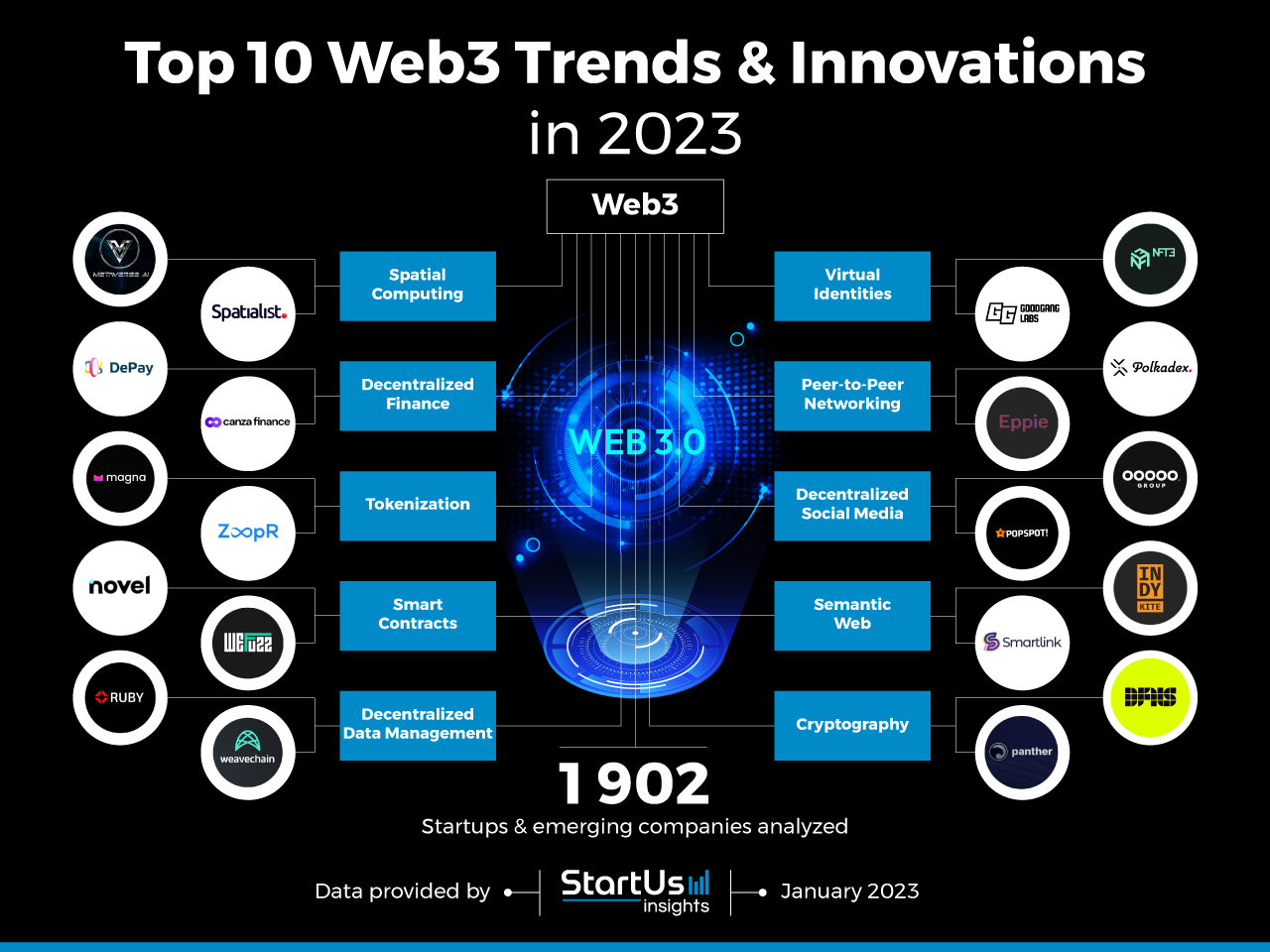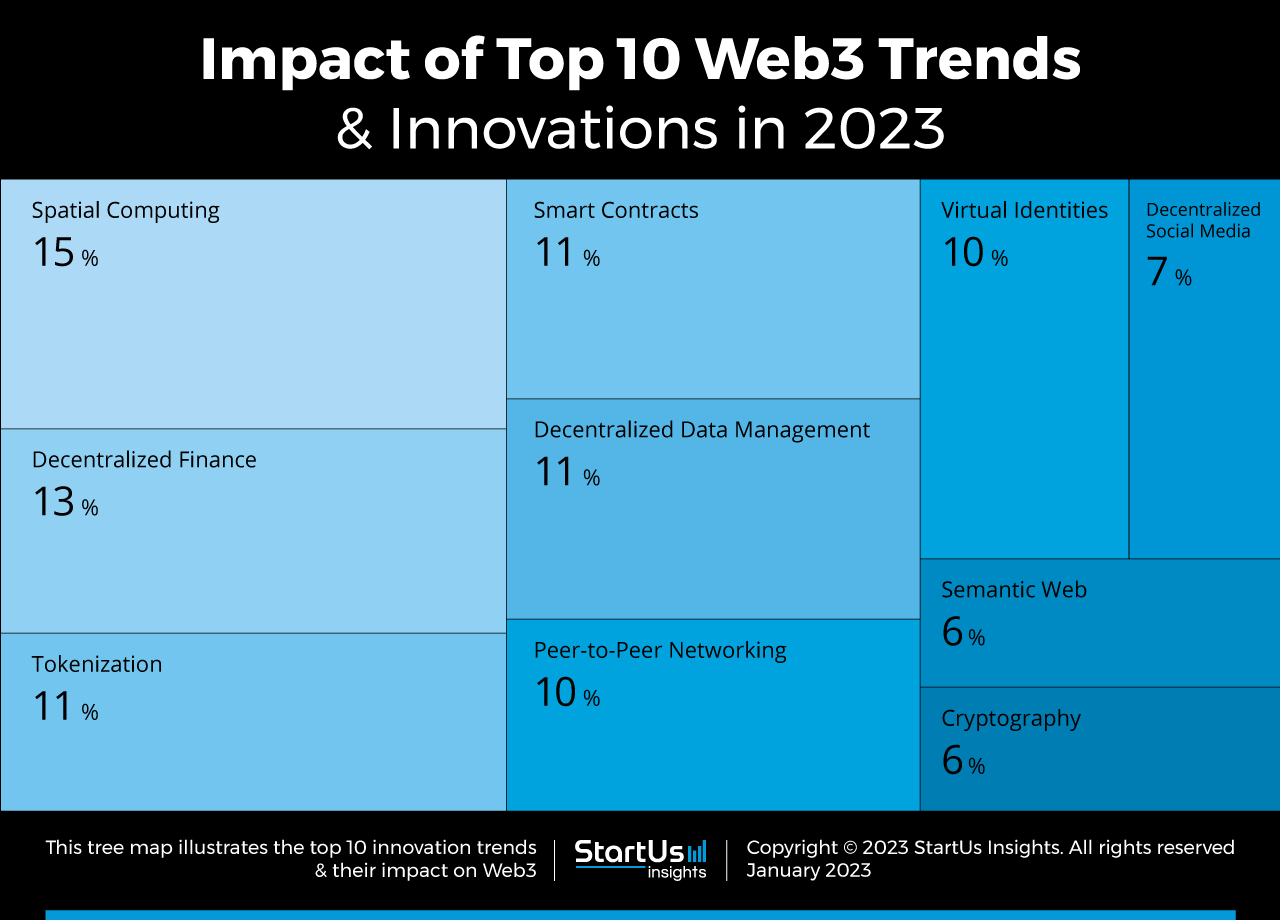Accelerate Productivity in 2025
Reignite Growth Despite the Global Slowdown
Web3 brings openness, decentralization, and data immutability as well as a trustless and permissionless architecture to the internet. It increases the transparency, performance, and security of decentralized applications on the world wide web (WWW). This report provides an overview of Web3 trends ranging from spatial and distributed computing to decentralized finance (DeFi) and social media. They allow companies to enhance operational visibility and better connect with their customers, enabling highly relevant business analytics. Read more to explore how they impact your business.
Innovation Map outlines the Top 10 Web3 Trends & 20 Promising Startups
For this in-depth research on the Top Web3 Trends & Startups, we analyzed a sample of 1 902 global startups and scaleups. The result of this research is data-driven innovation intelligence that improves strategic decision-making by giving you an overview of emerging technologies & startups in the Web3 industry. These insights are derived by working with our Big Data & Artificial Intelligence-powered StartUs Insights Discovery Platform, covering 2 500 000+ startups & scaleups globally. As the world’s largest resource for data on emerging companies, the SaaS platform enables you to identify relevant startups, emerging technologies & future industry trends quickly & exhaustively.
In the Innovation Map below, you get an overview of the Top 10 Web3 Trends & Innovations that impact 1 900+ companies worldwide. Moreover, the Web3 Innovation Map reveals 20 hand-picked startups, all working on emerging technologies that advance their field.
Top 10 Web3 Industry Trends in 2023
- Spatial Computing
- Decentralized Finance
- Tokenization
- Smart Contracts
- Decentralized Data Management
- Virtual Identities
- Peer-to-Peer Networking
- Decentralized Social Media
- Semantic Web
- Cryptography
Tree Map reveals the Impact of the Top 10 Web3 Trends
Based on the Web3 Innovation Map, the Tree Map below illustrates the impact of the Top 10 Web3 Industry Trends in 2023. Startups and scaleups are developing spatial computing platforms powered by metaverse, spatial web, and 3D web. Web3 is enabling decentralized solutions for finance, data management, and social media. Further, the demand for distributed computing networks to accelerate Web3 drives smart contracts, tokenization, virtual identities, and peer-to-peer networking solutions. Since the semantic web is an integral part of Web3, startups provide graph-based data mapping tools to improve data management in the decentralized internet. Lastly, cryptographic solutions impact the development of Web3 applications in ensuring the security and accessibility of network and data resources.
Global Startup Heat Map covers 1 902 Web3 Startups & Scaleups
The Global Startup Heat Map below highlights the global distribution of the 1 902 exemplary startups & scaleups that we analyzed for this research. Created through the StartUs Insights Discovery Platform, the Heat Map reveals that the US and Europe see the most startup activity.
Below, you get to meet 20 out of these 1 900+ promising startups & scaleups as well as the solutions they develop. These Web3 startups are hand-picked based on criteria such as founding year, location, funding raised, and more. Depending on your specific needs, your top picks might look entirely different.
Top 10 Web3 Trends in 2023
1. Spatial Computing
With advances in artificial intelligence (AI), blockchain, and graph databases, Web3 enables users to virtually collaborate through the intersection of the physical and digital worlds. Companies leverage spatial computing technologies like extended reality (XR), virtual reality (VR), and the metaverse to achieve this. These functional and interactive spaces also improve political systems and support economies. Moreover, spatial collaboration technologies greatly impact the communication between brands and their customers, improving engagement. Further, they leverage real-time data to provide hyper-personalized services and products to customers and increase their satisfaction. The inherent security of Web3 makes spatial collaboration for critical operations immune to cyber attacks.
Metaverse AI builds an Open Metaverse
Metaverse AI is a US-based startup that develops a Web3-based open metaverse. The startup combines VR, AI, decentralized identities, and blockchain to generate high-fidelity virtual humans. Users are able to own and control these identities across the metaverse and use them to play, build, and monetize their experiences.
Spatialist enables Spatial Web Content Management
Singaporean startup Spatialist creates a spatial content management system (s.CMS). The .startup’s platform integrates with existing tools and merges with apps to make them Web3-ready. It allows customers to explore digital content through voice commands, visors, and gestures. The platform’s spatial mapping protocol also enables eCommerce businesses to create and share spatial content, offering personalized experiences for customers.
2. Decentralized Finance
The Web3 ecosystem replaces fiat currency and transactions through decentralized finance. This peer-to-peer approach is powered by cryptocurrencies, like Ethereum, and decentralized exchanges (DeX). They enable users to perform transactions using smart contracts, eliminating banks and associated transaction costs. Moreover, DeFi enables peer-to-peer lending, borrowing, and staking, which replaces conventional investment vehicles. Non-fungible token (NFT) market also drives the growth of DeFi solutions due to the increasing demand for NFTs among creators and fans. Further, decentralized finance enables highly secure transactions and instantaneous cross-border payments. These advances, along with recent development in blockchains, will improve the efficiency of financial transactions.
DePay enables Web3 Payments
DePay is a Swiss startup that creates a Web3 payment platform. The startup’s application programming interface (API) allows any web application to accept cryptocurrency payments. It leverages a peer-to-peer, decentralized, and fraud-resistant architecture to enable DeFi. This allows businesses to mitigate in-house Web3 product development and simplify token exchange.
Canza Finance advances Open Finance
Nigerian startup Canza Finance offers a Web3-driven open finance ecosystem. The startup uses Web3, DeFi, on-chain financial services, and decentralized applications (dApps) to provide non-institutional financial services. This allows small and medium enterprises (SMEs) to leverage cross-border settlements, agent-based banking, crypto transactions, and crypto teller machines (CTMs).
3. Tokenization
Web3 introduces payment integration into the core stack, unlike the conventional approach of combining payment solutions as a separate feature. This approach requires tokenization or fractionalization of all services and products in the decentralized web. While fungible tokens like ERC-20 enable users to pay for services and products, NFTs find applications as collectibles, art, and brand assets. At the same time, payment tokenization improves transaction security, customer trust, and data compliance. It also streamlines recurring payments and simplifies subscription-based services. For businesses, tokenization significantly reduces the security threats associated with their digital infrastructure and improves revenue.
Magna Digital aids Live Token Distribution
Magna Digital is a US-based startup that facilitates live token distribution. The startup’s platform works on-chain and is active in Solana and Ethereum, among others. It allows businesses to stay compliant, track transactions, and automate tax withholdings. These features allow decentralized autonomous organizations (DAOs), crypto funds, and Web3 protocols to airdrop, stream, and distribute tokens to internal team members, investors, and communities.
Zoopr offers an NFT-based Social Network
UAE-based DAO Zoopr develops an NFT-based Web3 social network. The startup mints NFTs as unique name tokens (UNTs) in the Ethereum blockchain for each user. Users leverage these identities to connect with communities, gather crypto market insights, and utilize market analysis tools. Further, Zoopr’s network is powered by the decentralized semantic web. This allows users to be in control of their data while improving overall transparency.
4. Smart Contracts
Smart contracts are critical for the Web3 ecosystem to automate any type of transaction. They also power Web3-only benefits like decentralized autonomous organizations, decentralized authentication, and DeFi. Besides, smart contracts eliminate the need for intermediaries and automate data collection and processing, improving transaction visibility. That is why startups build smart contract development platforms. They allow businesses and communities to create smart contracts with minimal or no coding. Consequently, such platforms enable them to enter the Web3 ecosystem and deliver products and services to their customers.
Novel enables Automated Smart Contract Creation
Novel is a US-based startup that automates smart contract creation. The startup’s no-code platform for Web3 commerce allows businesses to create artwork, configure rarity, and set loyalty percentages. It then generates the collection and handles smart contract creation based on the set parameters. Further, the platform delivers the NFTs to Shopify stores. It thus allows customers to buy NFTs alongside physical products, improving sales.
WEFUZZ aids Smart Contract Audits
WEFUZZ is a Dutch startup that makes a security audit and bug bounty platform. This decentralized, blockchain-agnostic, crowdsourced platform features smart contracts that audit smart contracts, blockchains, and Web3 applications. This allows Web3 developers to mitigate vulnerabilities and cyber risks.
5. Decentralized Data Management
Web3 provides the necessary infrastructure for decentralized data management. It mitigates data silos while the semantic nature of Web3 enables data sharing across platforms and chains. This improves data transparency and aids businesses in optimizing operations. For example, blockchain-based data storage increases visibility into logistics processes and allows companies to find inefficiencies. Besides, since the users are always in control of their personal data, decentralized data management improves customer-business trust. Further, leveraging data fabric to standardize data management will enable flexible integration of data from various platforms and blockchains.
Ruby Protocol provides a Decentralized Privacy-Centric Web3 Protocol
Canadian startup Ruby Protocol creates a decentralized privacy-centric Web3 protocol. It is a private data management framework and data access control gateway that implements a privacy layer interacting with the multichain ecosystem. This enables private know-your-customer (KYC) authentication, NFT-gated access, regulatory-compliant asset ownership, and privacy-preserving cloud computing.
Weavechain aids Web3 Big Data Processing
US-based startup Weavechain facilitates Web3 big data processing. The startup’s middleware integrates into existing databases and uses smart hashing to enable immutability and provide data analytics for enterprise data. Moreover, it supports high transaction rates and features only 3 seconds time to finality. This allows businesses to accelerate data processing and enable compliant data monetization while transitioning to the Web3 ecosystem.
6. Virtual Identities
Unlike digital identities in Web 2.0, Web3 provides unique identities to users through digital wallets. This significantly improves the convenience of signing in or out of web applications. Additionally, such identities enable users to decide which data to share or not while navigating through Web3-native applications. That is why startups are developing digital identity platforms that allow users to create their own digital identities. They enable users to combine activities across social networks and eCommerce platforms. Further, virtual identities enable patients to share their medical history with doctors, ensuring better healthcare delivery.
NFT3 builds a Virtual Identity Network
NFT3 is a Canadian DAO that builds a virtual identity network. It uses decentralized identifier (DID)-wrapped NFTs to stake user identities, delegating identity ownership to the users. Moreover, DIDs travel through all Web3 Layers and thus reconciles back to the users. The network also provides a direct monetization path for users and offers a personal credit scoring system for Web3.
GoodGang Labs makes Digital Avatars
Singaporean startup GoodGang Labs creates a digital avatar communication platform for the metaverse. The startup’s platform, Beergang, allows users to access the metaverse through virtual identities. At the same time, its augmented reality (AR) camera app, ARGang, enables users to reveal their identity, allowing talents to generate revenue in a gamified way.
7. Peer-to-Peer Networking
Elimination of centralized platforms and intermediaries is one of the most critical aspects of Web3. The decentralized internet, thus, addresses the need for distributed computing power through peer-to-peer networks where users lend their computing resources. To aid this, Web3 startups offer tailored, open protocols to enable peer-to-peer transactions. They are powered by blockchain and smart contracts to automate processing distribution and enable cross-chain interoperability. Peer-to-peer networking also simplifies the implementation of DAOs by connecting decision-makers and enables decentralized financial transactions.
Polkadex provides a Decentralized Cryptocurrency Exchange
Estonian startup Polkadex develops Polkadex Orderbook, a Layer 2-based cryptocurrency exchange. The peer-to-peer solution enables users to exchange tokens in a trustless environment. It also features trustless cross-chain transfers, high liquidity, improved transaction rates, high-frequency trading, and trading bots. Further, the exchange allows users to register multiple wallets, delegate assets to third parties, and ensure asset safety.
Eppie provides Peer-to-Peer Email Infrastructure
Eppie is an Estonian startup that provides a peer-to-peer email infrastructure. It combines elliptic curve cryptography and server-free distributed computing to secure messages and eliminate intermediaries. As a result, all information is stored in the distributed network and it denies non-recipient data access requests.
8. Decentralized Social Media
Removing centralized social media platforms like Facebook and Instagram provides users with better control over their data. That is why decentralized social media is a highly beneficial feature of Web3 for its users. Through virtual identities and cryptocurrencies, social media users are able to better connect with influencers and brands. Similarly, Web3 social media allows influencers and brands to reach customers through multiple platforms, ensuring maximum visibility. This greatly improves fan engagement and revenue. Decentralized social media platforms also offer content creators an improved monetization network through NFTs to ensure fare pricing.
OOOOO improves Sports Fan Engagement
OOOOO is a UK-based startup that enhances sports fan engagement. The startup’s Web3-driven solution, Fanz, allows football clubs to issue tokens to fans and enable them to participate in decision-making. This provides real-time, actionable insights into fan preferences directly to football clubs.
PopSpot offers Ad-free Social Media
Estonian startup PopSpot develops Web3-powered, ad-free social media. The startup’s platform allows creators and users to generate content through various proprietary tools. Through it, creators are able to build paid fan communities while enabling fans to access exclusive content from influencers. Moreover, the startup ensures fair rewards to users and creators using crypto tokens for their interactions.
9. Semantic Web
The decentralized internet enabled through Web3 imparts semantic search capabilities to the network. This makes data machine-readable and generates a web of data-encompassing technologies. Consequently, Web3 eliminates the data silos associated with conventional networks and makes data sharing more flexible and secure. Moving away from keyword-based search also provides users with improved information access and enables businesses to reach their customers more effectively. As a result, startups offer AI and machine learning algorithms and APIs that simplify semantic web integration.
IndyKite makes Graph-Based Identity Fabric
IndyKite is a US-based startup that offers a graph-based identity fabric for banking, healthcare, manufacturing, and the Internet of Things (IoT) industries. The startup leverages the openCypher project to integrate graph processing in existing applications. Consequently, this enables companies to advance hyper-personalization, relationship-based access control, and business optimization.
Smartlink develops a Semantic Web-ready Escrow
Smartlink is a Canadian startup that makes a decentralized escrow and marketplace. The startup utilizes modular design in its products to impart semantic web properties. Additionally, the built-in escrow allows users to make secure transactions in Web3 while enabling businesses to mitigate scams and fraud.
10. Cryptography
Cryptography is integrated into Web3 through Layer 1 and 2 stacks. It offers zero or low-trust interaction protocols and takes care of encrypted data storage. Since Web3 combines DeFi, blockchain, and cryptography, financial transactions across the decentralized internet become transparent. Further, cryptographic techniques like secure multi-party computation (MPC) and zero-knowledge proof enable businesses and users to ensure data security. To aid this, startups develop cryptographic solutions and cryptography-integrated app development platforms tailored for Web3. They accelerate product development for businesses and ensure data compliance.
Dfns builds a Crypto Custody Network
French startup Dfns makes a keyless crypto custody network. It combines MPC and zero-knowledge proofs to issue secret shares that sign transactions. Moreover, Dfns’ zero trust network continuously authenticates, authorizes, and validates all interactions to improve transaction security. The startup also offers its solution as an API for businesses to accelerate crypto wallet integration while ensuring compliance.
Panther Protocol advances Zero-Knowledge Cryptography
UK-based startup Panther Protocol provides zero-knowledge cryptography for DeFi. The startup’s cross-chain protocol integrates with existing DeFi systems to improve the management of asset transactions and on-chain data. It allows users to deposit digital assets from any blockchain to mint private proprietary assets, zAssets, and transact privately. The protocol also allows businesses to interact with DeFi applications while preserving privacy and prove compliance by selectively disclosing data.
Discover all Web3 Trends, Technologies & Startups
The computing power of decentralized networks and the market penetration of DeFi will greatly impact the integration of Web3. Advances in affordable VR and XR solutions as well as the performance of blockchain transactions will also accelerate Web3 adoption. For example, the recent efforts by Ethereum to reduce its energy per transaction by moving to a proof-of-stake model improve the sustainability of its on-chain transactions. Further, DAOs will improve decision-making and enable decentralized science, healthcare, marketing, and more.
The Web3 Trends & Startups outlined in this report only scratch the surface of trends that we identified during our data-driven innovation and startup scouting process. Among others, the semantic web, interoperable networks, and DAOs will transform the sector as we know it today. Identifying new opportunities and emerging technologies to implement into your business goes a long way in gaining a competitive advantage. Get in touch to easily and exhaustively scout startups, technologies & trends that matter to you!






![Future of Robotics: 12 Trends Powering the Next Wave [2025-2030]](https://www.startus-insights.com/wp-content/uploads/2025/06/Future-of-Robotics-SharedImg-StartUs-Insights-noresize-420x236.webp)



